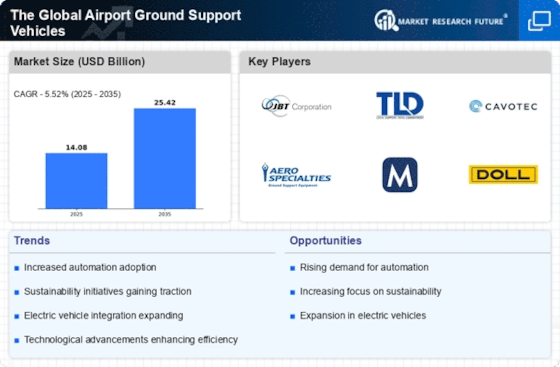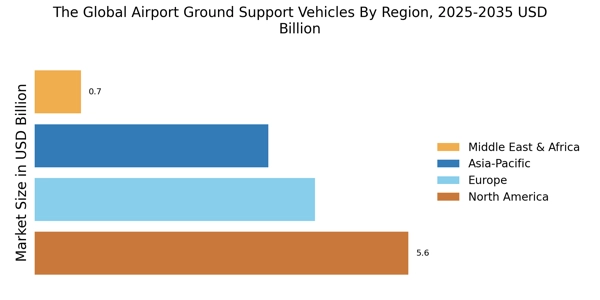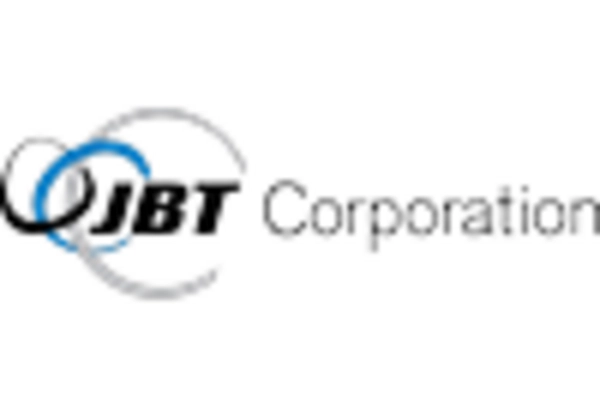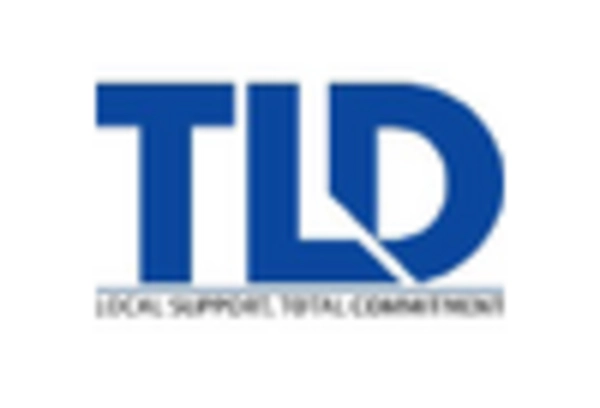Focus on Sustainability
Sustainability initiatives are increasingly influencing The Global Airport Ground Support Vehicles Industry. Airports are under pressure to reduce their carbon footprint and implement eco-friendly practices. This has led to a growing preference for electric and hybrid ground support vehicles, which offer lower emissions compared to traditional diesel-powered options. Recent studies suggest that the market for electric ground support vehicles could witness a compound annual growth rate (CAGR) of 25% over the next five years. Additionally, airports are investing in sustainable practices such as recycling and waste reduction, further driving the demand for environmentally friendly ground support solutions. As sustainability becomes a core focus for the aviation industry, the market for green ground support vehicles is expected to flourish.
Technological Innovations
Technological advancements play a crucial role in shaping The Global Airport Ground Support Vehicles Industry. Innovations such as electric ground support vehicles, automated baggage handling systems, and real-time tracking technologies are transforming airport operations. The integration of these technologies not only enhances operational efficiency but also reduces environmental impact. For instance, the adoption of electric vehicles is expected to grow significantly, with projections indicating a market share increase of over 30% by 2030. Furthermore, the implementation of smart technologies facilitates better fleet management and reduces operational costs. As airports strive to modernize their infrastructure, the demand for technologically advanced ground support vehicles is likely to escalate, driving market expansion.
Increasing Air Traffic Demand
The rise in air travel demand is a pivotal driver for The Global Airport Ground Support Vehicles Industry. As passenger numbers continue to grow, airports are compelled to enhance their operational efficiency. This surge in air traffic necessitates a corresponding increase in ground support vehicles to manage baggage handling, aircraft towing, and passenger transport. According to recent data, the global air passenger traffic is projected to reach 8.2 billion by 2037, indicating a robust growth trajectory. Consequently, airports are investing in advanced ground support vehicles to accommodate this influx, thereby propelling market growth. The need for efficient ground operations is further underscored by the competitive landscape of the aviation sector, where timely and effective service delivery is paramount.
Expansion of Airport Infrastructure
The expansion of airport infrastructure is a vital driver for The Global Airport Ground Support Vehicles Industry. As countries invest in upgrading and expanding their airport facilities to accommodate increasing passenger volumes, the demand for ground support vehicles rises correspondingly. New terminals, runways, and cargo facilities require efficient ground handling operations, which in turn necessitate a diverse fleet of support vehicles. Recent reports indicate that global airport infrastructure investment is expected to exceed USD 1 trillion by 2030. This substantial investment is likely to spur the procurement of advanced ground support vehicles, thereby driving market growth. Furthermore, the expansion of airport infrastructure is often accompanied by the adoption of innovative technologies, further enhancing operational efficiency.
Regulatory Compliance and Safety Standards
Regulatory compliance is a significant driver for The Global Airport Ground Support Vehicles Industry. Governments and aviation authorities are implementing stringent safety and environmental regulations that airports must adhere to. Compliance with these regulations often necessitates the acquisition of modern ground support vehicles equipped with advanced safety features and emissions controls. For instance, the International Civil Aviation Organization (ICAO) has established guidelines that promote the use of safer and more efficient ground handling practices. As airports strive to meet these regulatory requirements, the demand for compliant ground support vehicles is likely to increase. This trend not only enhances safety but also fosters a culture of accountability within the aviation sector.

















